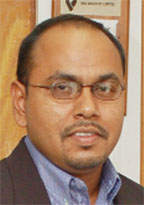– says procedures must be driven by transparency
— will engage Customs on any chamber member corruption-related concern
Simplification and transparency of systems and procedures within state agencies that provide important services can go a far way towards reducing the level of corruption in the relationships between those state agencies and the people seeking their services. “We need to make changes to complex systems. We need to make them simpler, more transparent, more accessible, President of the Georgetown Chamber of Commerce and Industry (GCCI) Chandradat Chintamani.
The GCCI President was at the time providing an invited comment to a question raised by this newspaper regarding the assertion in the recently published 2009 Transparency International Global Corruption Report regarding the collection of billions of dollars in bribes and kickbacks by politicians and public servants from businessmen seeking various services from the state.

And according to Chintamani, state systems and procedures that are particularly vulnerable to corrupt practices must rely to a greater extent on technology that minimizes human intervention. “We need to enhance the use of technology. We need to reduce our dependence on sustained involvement and intervention by people. The truth of the matter that where there is involvement by people in these processes we become vulnerable to corrupt practices,” Chintamani said.
The GCCI President told Stabroek Business that he believed his views on the increased application of technology in state-run service systems was particularly relevant tothe Customs and Trade Administration which is widely believed to be particularly vulnerable to corrupt practices involving Customs officials and businessmen.
“I have said before that as far as Customs is concerned we should consider finding an area on each wharf where surveillance systems can be set up to monitor the processing of containers of cargo,” Chintamani said. “What this does is to create a system that allows for monitoring from an office. The process allows you to see what is inside the container from where you are so that you are in a position to provide quicker clearance. I believe that what this does is to lay the system open, to lay it bare. The room for corruption is created when you have two or three persons sitting behind closed doors making decisions about the clearance of goods.”
Meanwhile, Chintamani told Stabroek Business that he believed the allusion in the Transparency International Report to the complicity of businessmen in the bribes and kickbacks applied to some transactions here in Guyana. “Some of us in the private sector who may have to pay a liability of $2 million are prepared to pay bribes to the level of maybe $1.5 million. The preferable thing to do of course is to let that $2 million go to the state so that we can see that money utilized to the benefit of the country. Of course there is another side to this. There are some people who might question the way in which the money is used by the state. In such cases they would pay that bribe and simply close the door or the transaction.”
And while the GCCI President says he believes that there are still loopholes that can be closed in order to reduce the scale of corruption, he feels nonetheless, that some systems have been put in place within the Customs and Trade Administration “and within the wider GRA” to reduce the level of corrupt practices. “The process has improved tremendously. I can say this both as President of the Chamber and as a businessman. Within a few days of a container arriving it is processed and in my warehouse. A number of other members of the Chamber have also reported improvements in the quality of service that they receive from Customs.”
Meanwhile, Chintamani told Stabroek Business that he believed the issue of the payment of bribes and kickbacks for services provided by state agencies was “a significant challenge but one which we have to confront.” The Chamber President told Stabroek Business that the frequent pronouncements that have been made by President Bharrat Jagdeo on his administration’s posture towards corruption did not appear to be attended by speedy action. “I happen to believe that the President is sincere in his attitude to corruption. The problem is that it some times does not appear that the people whose job it is to close the door on corruption are acting in accordance with the wishes of the President,” he added.
Chintamani said he is prepared to approach the Guyana Revenue Authority on any corruption-related or other matter raised with the Chamber. “I am willing to take these issues up with the Customs. At the same time, however, I need to be careful that when I approach the head of the GRA he does not pull a file on the person who I am purporting to represent and point to irregularities in that person’s dealings with Customs.”
